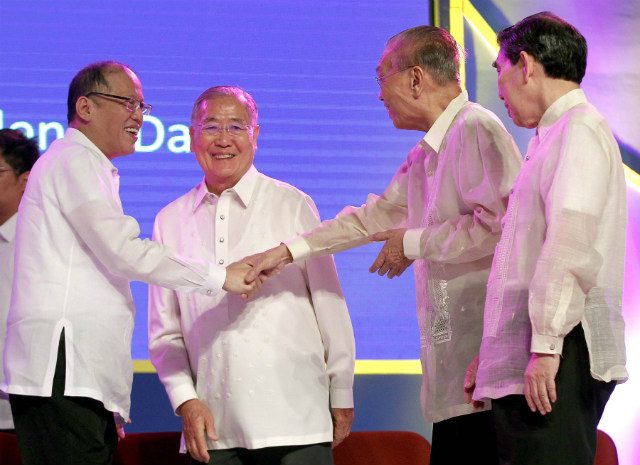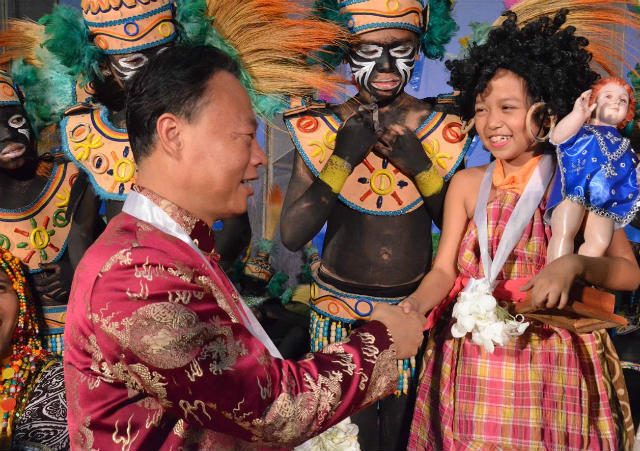SUMMARY
This is AI generated summarization, which may have errors. For context, always refer to the full article.

MANILA, Philippines – The Philippine president’s latest remarks against China spoiled a historic milestone on Tuesday, June 9, the 40th anniversary of diplomatic relations between Manila and Beijing.
Chinese businessmen cancelled a huge anniversary celebration on Monday evening, June 8, after Philippine President Benigno Aquino III – for the second time – compared China to Nazi Germany.
Aquino was protesting China’s aggression in the South China Sea (West Philippine Sea), a major trade route that is now the subject of a bitter dispute between Manila and Beijing.
Before Aquino made this comment, Chinese Ambassador to the Philippines Zhao Jianhua was supposed to speak at Monday’s event, along with the Philippine president.
It would have been the two countries’ biggest party in years.
In particular, it would have marked the fourth decade after then Philippine President Ferdinand Marcos and then Chinese Premier Zhou Enlai on June 9, 1975, signed a joint communiqué to establish Philippine-China relations.
Monday’s event was meant to be “3-in-1” – celebrating the 40th anniversary of Philippine-China relations, the 14th Filipino-Chinese Friendship Day, and the Philippines’ 117th Independence Day.
The event’s organizers, however, chose to celebrate only the Philippines’ Independence Day – without the Chinese ambassador and with Aquino as the guest of honor.
‘Awkward situation’
Angel Ngu, president of the Federation of Filipino-Chinese Chambers of Commerce and Industry Inc (FFCCCII), explained that this is the prudent thing to do.
Ngu told Rappler: “If the President is there, maybe he will mention the West Philippine Sea, and the China ambassador will mention the South China Sea. It will be a very awkward situation.”
Ngu said the FFCCCII changed its mind about the event in an emergency meeting on Saturday, June 6.
He had just arrived in the Philippines on Friday, June 5, after accompanying Aquino on a state visit to Japan. That was where Aquino likened China to Nazi Germany, the way he did in an interview published by the New York Times in February 2014.
Ngu said Aquino’s Nazi remark was a reason why the FFCCCII changed Monday’s big event. He said, “The issue escalated.”
The Chinese ambassador, for one, told reporters that Aquino’s remark “is utterly unacceptable and irresponsible,” according to the Philippine Star. Zhao also said Aquino’s comment “seriously hurt the feelings of 1.3 billion people” in China.
Just 3 months earlier, Zhao said the Philippines and China “are destined to be friends and partners.”

‘Almost rock bottom’
The Palace, on the other hand, has tried to downplay Aquino’s Nazi remark against China, one of the Philippines’ biggest trading partners. (READ: Malacañang on China dispute: Aquino has Chinese roots)
In fact, in his speech before Filipino-Chinese businessmen on Monday evening, Aquino diverted the audience’s focus from the South China Sea dispute. Not once did he mention the issue.
He told an audience initially pegged at around 1,200, “Today, we gather as friends.”
Aquino then urged the Philippines and China to strengthen their relationship with “mutual respect, the determination to maintain fairness and harmony, and a firm commitment to the rule of law.”
“It is my hope that we all bear this in mind, as we commemorate the independence of the Philippines – an occasion that likewise underscores our interdependence with the world and, consequently, our desire, then as today, to be and to act as a responsible member of the community of nations,” Aquino said.
Despite these diplomatic words, observers say Aquino’s Nazi remark has done more harm than good.
Ngu said that while tension exists between the Philippines and China, the the tension is usually “not up to this degree.”
Veteran China analyst Chito Sta Romana, for his part, told Rappler that Aquino’s Nazi remark “is not going to help.”
Sta Romana, former Beijing bureau chief of ABC News, said in an interview with Rappler: “We’re hitting almost rock bottom in Philippine-China relations. We’ve never gone through such a difficult period as we’re going through now. Some people have said we are almost on the brink of conflict. But that’s because of the principal differences on this issue, because it’s so complicated.” – With reports from Ayee Macaraig and Agence France-Presse/Rappler.com
Add a comment
How does this make you feel?
There are no comments yet. Add your comment to start the conversation.